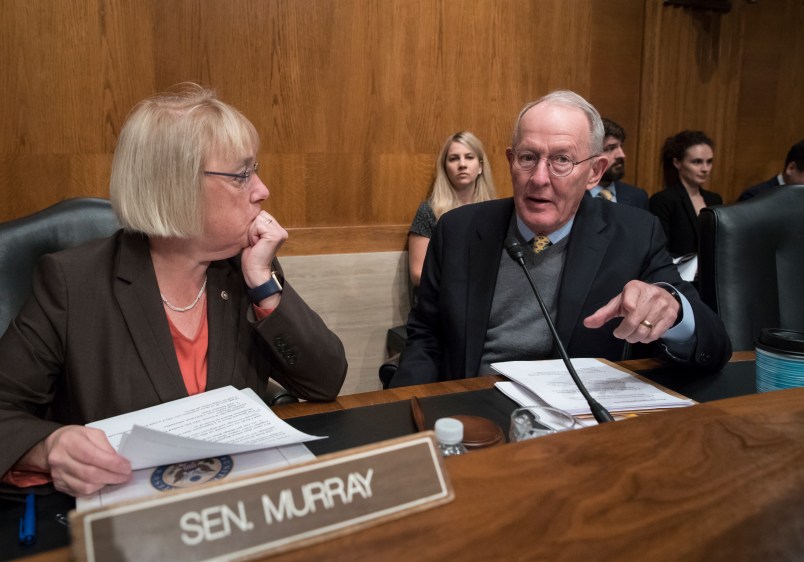By Wednesday afternoon, after President Donald Trump had cycled through multiple positions on a deal to stabilize the Affordable Care Act’s individual market—from qualified support to outright rejection and back again—the usually reserved Sen. Patty Murray (D-WA) had had it.
“The President has had six positions on our bill,” she said curtly as she power-walked through the Senate basement so fast reporters had to jog to keep up. “What I am focused on is putting forward a proposal that lowers costs for consumers and brings some stability to the market.”
Asked if the deal is still alive despite the President’s apparent opposition, Murray snapped: “Yes, of course it is.”
Her colleagues on both sides of the aisle are not so sure.
With mixed messages from the White House, staunch opposition from House Republicans, and lingering confusion and mistrust after months of failed Obamacare repeal attempts, the ability of Congress to pass a true bipartisan health care bill is in question. While many senators in both parties warn that inaction will trigger large insurance premium hikes and market chaos, others questions the basic premise of the stabilization bill, calling its benefit an “allegation.”
Murray’s Republican counterpart on the deal, Sen. Lamar Alexander (R-TN), received a rude shock Wednesday as he attempted to whip votes for the bill to fund cost-sharing reduction payments to insurers.
A few hours after receiving an early morning call from President Trump praising the bipartisan deal and promising to consider it, Alexander saw a tweet from the White House saying Trump would “never” support a bill to resume the subsidies. Then, just as Alexander was arguing to Hill reporters that the tweet did not necessarily mean opposition and instead indicated he was still considering the measure, the White House press secretary confirmed that Trump does not support the bill.
“The President literally called me a week ago Saturday and asked me to do this,” a harried-looking Alexander told a cluster of reporters Wednesday afternoon. “And then we talked again last Saturday about it, and then he called me again this morning. He’s made all those calls.”
Alexander added that Republicans need to realize that they will own the damage that ensues in the health care marketplace—including rate hikes and insurer exits that have already begun—if they do not act to restore the subsidies the President cut last week.
“We would like to replace Obamacare. That’s nearly unanimous in the Republican caucus,” he said. “But it will become increasingly unanimous in the Republican caucus that we understand that between today and the time when we can replace Obamacare is two or three years. If we do nothing, we’ll create chaos.”
Alexander has managed to win over some of his GOP colleagues as co-sponsors of the bill, including Sens. Lisa Murkowski (R-AK), Bob Corker (R-TN) and Mike Rounds (R-SD). But others, from the leadership to the rank and file, remain deeply skeptical.
On Wednesday, leadership team member John Thune (R-SD) called the effort “stalled,” while GOP Whip Sen. John Cornyn (R-TX) played down expectations about its passage, calling it “the beginning of a larger conversation.”
“Obviously, until the President is on board, there need to be changes made to satisfy him,” he said. “I think the President’s support is going to be key.”
Other senators, including Sens. John Kennedy (R-LA) and Rand Paul (R-KY), questioned the very premise of the bill—that because the subsidies are guaranteed by law for low-income patients, and because Obamacare’s tax credits increase whenever premiums go up, paying the CSR subsidies actually saves the government billions of dollars. Kennedy and others also expressed concern about passing anything that props up the Affordable Care Act in any way.
“I don’t want to put paint on rotten wood,” he told TPM. “I want to see that this is going to actually help as opposed to just throwing money at the problem.”
Democrats, meanwhile, are anxious to pass the bill as soon as possible, and voiced incredulity that any lawmaker could oppose it.
“This is so bad,” Sen. Sherrod Brown (D-OH) told TPM outside the Senate chamber. “If McConnell and Cornyn and the President don’t let Alexander and Murray and all of us fix this, it’s going to mean higher prices, it’s going to be terrible for our country. I can’t imagine they would just blow this up. I can’t imagine anybody would be that mean-spirited.”










